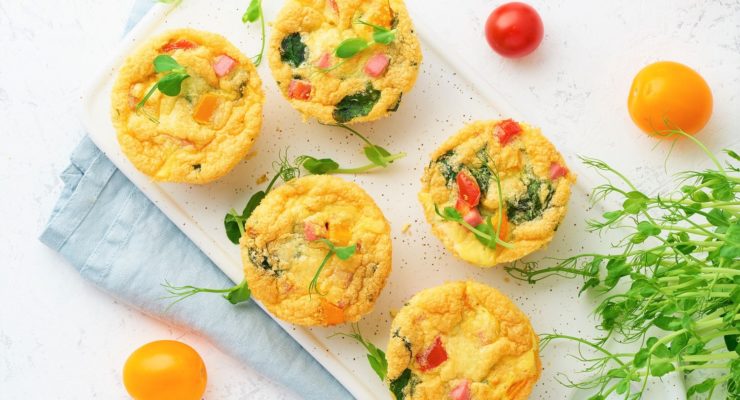You lift weights and work those resistance bands hard. You squat and lunge, push and pull up, and hold plank ‘til your body trembles. All excellent moves designed to help you gain muscle.
That’s important for lots of reasons: As you get older, muscle mass naturally decreases—after age 30, you can lose as much as 3% to 5% per decade. Most men will lose about 30% of their muscle mass during their life, according to Harvard Medical School. When muscle mass goes down, body fat goes up. Plus, muscle burns more calories than fat, so the more muscle you have, the better your weight control.
Strength training is step one for how to build muscle. But do you know what to eat to gain muscle? What you eat on the days you work out—and the days you don’t—is just as important. Without the right mix of nutrients, your body won’t have the fuel it needs to achieve your muscle-building goals.
Protein, of course, is key to muscle building—it is broken down into amino acids, which is needed to create muscle. But that nutrient can’t do it alone: your body also needs carbohydrates and healthy fats that provide energy to your muscles and are used to power your workouts.
Check out this list of 10 of the top foods for gaining lean muscle. We’ve also provided some recipes and meal prep ideas for muscle gain!
1. Eggs

There are about six grams of high-quality protein in these little spheres—complete with all nine essential amino acids. One of those amino acids—leucine—comes plentiful in eggs, and research shows is important for gaining muscle. Eggs also contain B vitamins, which help your body make energy from food; as well as choline, which helps with metabolism.
Feel free to eat it whole—yolk and all: A study, published in the American Journal of Clinical Nutrition, found eating whole eggs after a workout elicited a 40% greater muscle-building response than eating just the whites.
Start your morning right with one of the 11 egg-cellent recipes below.
2. Chicken Breast

A muscle-building standard, skinless chicken breast packs about 13 grams of protein for muscle gain into a two-ounce piece, and contains much (much) less fat than darker meat thighs.
Bonus perk: Chicken is rich in selenium and zinc! According to research, published in the journal Nutrients, high dietary selenium intake is associated with a lower body mass index (BMI), waist circumference and total body fat percentage. Another study, published in Advanced Pharmaceutical Bulletin, found that zinc consumption may also improve BMI and body weight.
Need a (winner winner) chicken dinner recipe? Here are 17 ways to cook this versatile protein healthy and delicious! >
And when you get sick of this bird, turkey works for muscle gain, too: two ounces of cooked ground turkey weighs in at 15 grams of protein. Enjoy it in a chili, make it into a burger or get a little fancy with this Slow Cooker Turkey Bolognese with Spaghetti Squash Pasta!
3. Salmon

You get almost six grams of protein in every ounce of this oily fish—plus a heaping dose of omega-3 fatty acids, a type of healthy fat which helps protect against cardiovascular disease, improve brain health and protect against inflammation. Research also suggests omega-3s may help protect against muscle loss.
Need more reasons to eat salmon? Watch this! > Then heat up the grill and try this Cedar Plank Salmon recipe.
4. Greek Yogurt

It offers both fast-digesting whey protein and slow-digesting casein protein. That combo of proteins is ideal for increasing lean mass, according to researchers at Baylor University.
Dive in spoon first after a workout, or try it as a spicy dip or chicken marinade. Just make sure your yogurt is actually Greek; regular versions have about half the protein (and more than double the sugar).
5. Peanuts

They have more protein than any other nut, with seven grams per ounce. They also contain six grams of carbohydrates and a bunch of healthy fats per serving—the trifecta of muscle-building nutrients. Plus, each crunchy nut has satisfying fiber and more than 30 essential vitamins and minerals—including magnesium, which may improve exercise performance, according to a study in the journal Nutrients.
6. Lean Beef

Lean is key to cut fat and calories, and when eaten in moderation, it’s a good source of fuel for your muscles. Two ounces of ground beef has about 14 grams of protein, B vitamins and zinc—which helps your body recover and heal fast post-exercise. One study found eating lean red meat as part of a high protein diet increased muscle strength and the amount of lean muscle mass gained with resistance training.
Perfect for your next Taco Tuesday is this high-protein slow cooker taco soup!
7. Beans

Black, pinto, kidney: pick your favorite and reap the benefits of eight grams of protein per half-cup. As we mentioned earlier, protein is key to muscle building.
An added bonus: the fiber in beans create a feeling of fullness and satisfaction, which may help control your appetite. In a study of 35 obese men fed four different protein-rich diets, the diet providing the majority of protein from legumes (including beans) induced the greatest amount of weight loss in an eight-week period.
8. Shrimp

Shell-on, shell-off, peeled, deveined, any way you buy them, you can rest assured you’re getting a punch of protein, without packing on any extra pounds. These little crustaceans are loaded with protein—20 grams in three ounces, cooked. They’re also in super low in calories, with only 84 calories in the same amount.
From noodle bowls to fajitas, kebabs to spring rolls, check out these inspired shrimp recipes!
9. Brown Rice

Carbohydrates are the muscle-builders here: they’re your body’s main source of fuel. A half-cup cooked of brown rice has about 25 grams of it. It’s low in protein (with less than three grams), but the bulk and fiber in these whole grains helps you feel fuller on fewer calories.
Serve it alongside your favorite meat or fish, mix it with beans in a Tex-Mex dish, or for a little something sweet, try this instant pot rice pudding!
10. Cottage Cheese

The protein in cottage cheese (almost 13 grams per half-cup) consists of casein, which is good for building muscle. Because casein is absorbed slowly, it also helps with recovery and decreases muscle breakdown. Choose 1% fat to help limit calories. Ever try cottage cheese in a sandwich? Try this tasty recipe!
Reach your goals with a high-protein weight loss plan: Learn more about Nutrisystem!
The post 10 Healthy Foods to Gain Muscle appeared first on The Leaf.





Comments
Post a Comment